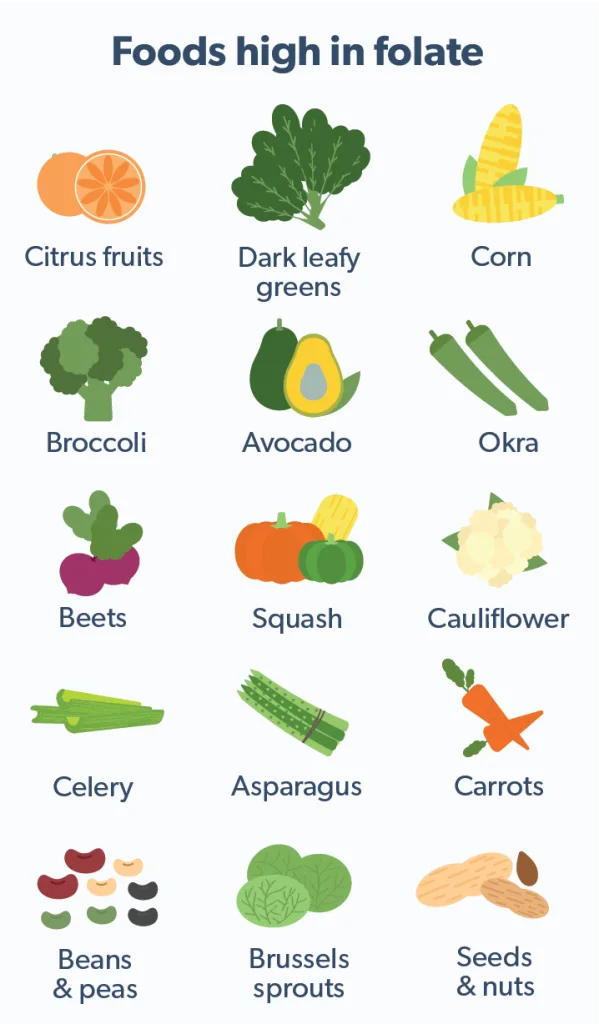Here's what we'll cover
Here's what we'll cover
Folic acid is a synthetic version of folate, also known as vitamin B9. Folate is vital for several bodily functions. Unlike some other vitamins, your body can't produce folate on its own.
Folate isn't stable enough to just store in a pill. That’s why supplements and fortified foods use folic acid, which is a hardier housing that your body can break down into folate. Technically they're two different things, though some people might use the terms interchangeably. Folic acid on its own does nothing for us. Only after it's metabolized do we get the folate our bodies can use.
Livers, especially from poultry, are one of the best sources. Beans, legumes, nuts, and seeds are the top folate suppliers for plant-based eaters or those less enamored with organ meats. Leafy greens, citrus, and avocados are great sources as well (USDA, n.d.).

Because folate is essential for pregnant women in helping prevent certain birth defects, many countries have mandated the fortification of cereal grains with folic acid. The United States put this into practice in 1998. Unless you're milling your flour from scratch, most baked goods you eat will provide a significant amount of folic acid because of this fortification. In fact, most Americans already consume more folic acid than they can process (Smith, 2008).
One has to be careful, though. Before beginning any supplement regimen, even an over-the-counter one, talk to your healthcare provider and follow their advice. Too much folic acid can be dangerous, as we’ll discuss below. Folate can also affect your ability to process certain medications.
Many men take folic acid because they've heard it can be beneficial for some conditions. We'll look at a few of the things folic acid is marketed for and any evidence to back up the claims.
Who needs extra folic acid?
If you have a healthy folate level through your diet, elevating it beyond that with supplements probably isn't necessary.
That said, some men are folate-deficient, which can lead to megaloblastic anemia. With a name like that, you can imagine it might cause serious health problems. Folate deficiency usually stems from something that either increases folate usage or prevents folate absorption. Conditions that can lead to folate deficiency include, but aren’t limited to (Maron, 2009):
Celiac disease
Crohn's disease or inflammatory bowel syndrome (IBS)
Diabetic enteropathy
Liver disease
Tuberculosis
Psoriasis
Cancer
Sickle cell anemia
Alcoholism
Poor diet
Folate deficiency may also result from some procedures, including dialysis, gastric bypass or other stomach surgery, and bowel surgery (Maron, 2009).
For patients with such conditions, micronutrient screenings can be done to check folate and vitamin levels. If folate levels are low, healthcare providers may encourage supplements such as folic acid.
Folate deficiency, if left untreated, can lead to infertility, cardiovascular disease, and cancer. Keep in mind that just because a lack of folate can cause some conditions, it doesn't mean taking extra folate will prevent or correct them—you’ll want to follow the guidance of your healthcare provider.
Folic acid and male fertility
Folic acid has been part of the cocktail of ingredients in snake-oil products making false claims of "male enhancement" for years. However, it's also sold as a standalone supplement, or in combination with zinc, by more reputable sources. You may read claims that it can increase semen quality, sperm count, or mobility. Is there anything to folic acid as infertility treatment?
A meta-analysis of historical studies found some evidence that a daily supplement of folic acid, or folic acid plus zinc, might help infertile or sub-fertile men have a higher concentration of sperm in their semen (Irani, 2017). However, the supplement didn’t seem to affect how well the sperm worked, so it’s not clear whether there would be a significant impact on fertility.
A larger, more recent study with over 2,000 couples seeking infertility treatment has poured cold water on the use of folic acid to affect fertility. Half the male partners took folic acid and zinc supplementation, the other half placebo. After six months, their semen was tested. In nearly every category—sperm count, sperm motility, total volume—there was no significant difference between the supplement and placebo groups (Schisterman, 2020).
Additional follow-up continued for 18 months from the start of treatment. Researchers found no significant difference in the number of couples who were able to eventually have live births. Given potential side effects such as gastrointestinal symptoms, the evidence so far suggests there may not be many benefits to taking folic acid for male fertility. (Schisterman, 2020).
Folic acid and depression
Depression is a complex condition that can have many different causes.
Multiple studies have found an association between low folate levels and depression (Bender, 2017). Of course, this should not be taken to mean that having low folate will always lead to depression, nor that having normal folate levels will prevent depression.
Very few rigorous studies have been done on whether folic acid supplements are beneficial to those suffering from depression. A meta-analysis of multiple clinical trials suggested short-term use had no benefit. Still, long-term use might reduce or delay relapses in some people (Almeida, 2015).
This is an area where the differences between folic acid and folate should be noted. One study of depression in seniors found that only naturally occurring folate intake from foods decreased the risk of depression. Enriched grains and folic acid dietary supplements did not appear to alter the risk. The researchers proposed that it may be other components in folate-containing foods that are actually affecting depression risk, not the folate itself (Payne, 2009).
Folic acid and cardiovascular health
We should all be concerned with our hearts and circulatory systems. Heart disease is typically the leading cause of death in the United States. Folate is necessary for reducing homocysteine. It does this, along with vitamins B6 and B12, by converting it into an essential amino acid, methionine.
Too much homocysteine in the body can lead to a condition called hyperhomocysteinemia. High homocysteine carries a greater risk of coronary artery disease, heart attack, and stroke (Maron, 2009).
Unfortunately, even though research has shown that B-vitamin therapy does lower blood homocysteine levels, it does not decrease the risk of cardiovascular disease (Maron, 2009).
Folic acid and hair
Much like pills for male virility, many products are marketed with dubious claims of either stopping or reversing hair loss or even hair greying. Folic acid is often found in these products.
Folate does encourage cell growth, including hair. Folate helps create methionine, which plays a role in hair cell repair (Wood, 2009). And folate deficiency has been noted in prematurely greying patients (Daulatabad, 2017).
But whether folic acid supplements are an effective treatment for premature greying has not been studied very extensively.
Potential dangers of folic acid
Just as folate deficiency can cause problems, too much folic acid can, as well. Some types of cancer have even been linked to both too little and too much folate. And too much folic acid could hide a vitamin B12 deficiency by alleviating early warning signs and allowing other damage to continue unchecked (Smith, 2008).
Remember, folate and folic acid are different. Because of the way folic acid is metabolized, you actually get more folate from folic acid than you would from folate-rich foods. For example, if you ate a sandwich made from enriched bread with 120 micrograms of folic acid, that would be equivalent to 200 mcg DFE, which stands for dietary folate equivalent.
The Office of Dietary Supplements at the National Institutes of Health recommends a DFE intake of 400 micrograms for most male adults. And to guard against the negative effects of too much folic acid, the recommended upper limit of DFE intake is 1000 micrograms for adults (NIH, n.d.).
A little confusing? Sure. The good news is, naturally occurring folate hasn’t been associated with the same health concerns as folic acid, so dig into those whole foods as often as you can! If you haven't been directed to take folic acid by your healthcare provider but feel compelled to up the folates regardless, starting with a lentil salad and some leafy vegetables is a healthy and tasty way to go.
DISCLAIMER
If you have any medical questions or concerns, please talk to your healthcare provider. The articles on Health Guide are underpinned by peer-reviewed research and information drawn from medical societies and governmental agencies. However, they are not a substitute for professional medical advice, diagnosis, or treatment.
Almeida, O. P., Ford, A. H., & Flicker, L. (2015). Systematic review and meta-analysis of randomized placebo-controlled trials of folate and vitamin B12 for depression. International Psychogeriatrics, 27 (5), 727–737. doi: 10.1017/S1041610215000046 Retrieved from https://pubmed.ncbi.nlm.nih.gov/25644193/
Bender, A., Hagan, K. E., & Kingston, N. (2017). The association of folate and depression: A meta-analysis. Journal of Psychiatric Research, 95, 9–18. doi: 10.1016/j.jpsychires.2017.07.019 Retrieved from https://pubmed.ncbi.nlm.nih.gov/28759846/
Choi, S. W., & Mason, J. B. (2002). Folate status: Effects on pathways of colorectal carcinogenesis. The Journal of Nutrition, 132 (8 Suppl), 2413S-2418S. doi: 10.1093/jn/132.8.2413S Retrieved from https://pubmed.ncbi.nlm.nih.gov/12163703/
Daulatabad, D., Singal, A., Grover, C., & Chhillar, N. (2017). Prospective analytical controlled study evaluating serum biotin, vitamin b12, and folic acid in patients with premature canities. International Journal of Trichology, 9 (1), 19–24. doi: 10.4103/ijt.ijt_79_16 Retrieved from https://pubmed.ncbi.nlm.nih.gov/28761260/
Fava, M., & Mischoulon, D. (2009). Folate in depression: Efficacy, safety, differences in formulations, and clinical issues. The Journal of Clinical Psychiatry, 70 Suppl 5, 12–17. doi: 10.4088/JCP.8157su1c.03 Retrieved from https://pubmed.ncbi.nlm.nih.gov/19909688/
Irani, M., Amirian, M., Sadeghi, R., Lez, J. L., & Latifnejad Roudsari, R. (2017). The effect of folate and folate plus zinc supplementation on endocrine parameters and sperm characteristics in sub-fertile men: A systematic review and meta-analysis. Urology Journal, 14 (5), 4069–4078. Retrieved from https://pubmed.ncbi.nlm.nih.gov/28853101/
Maron, B. A., & Loscalzo, J. (2009). The treatment of hyperhomocysteinemia. Annual Review of Medicine, 60, 39–54. doi: 10.1146/annurev.med.60.041807.123308 Retrieved from https://pubmed.ncbi.nlm.nih.gov/18729731/
National Institutes of Health Office of Dietary Supplements (n.d.). Folate. Retrieved February 6, 2021, from https://ods.od.nih.gov/factsheets/Folate-HealthProfessional/
Payne, M. E., Jamerson, B. D., Potocky, C. F., Ashley-Koch, A. E., Speer, M. C., & Steffens, D. C. (2009). Natural food folate and late-life depression. Journal of Nutrition for the Elderly, 28 (4), 348–358. doi: 10.1080/01639360903417181 Retrieved from https://pubmed.ncbi.nlm.nih.gov/21184377/
Schisterman, E. F., Sjaarda, L. A., Clemons, T., Carrell, D. T., Perkins, N. J., Johnstone, E., et al (2020). Effect of folic acid and zinc supplementation in men on semen quality and live birth among couples undergoing infertility treatment: A randomized clinical trial. JAMA, 323 (1), 35–48. doi: 10.1001/jama.2019.18714 Retrieved from https://pubmed.ncbi.nlm.nih.gov/31910279/
Smith, A. D., Kim, Y.-I., & Refsum, H. (2008). Is folic acid good for everyone? The American Journal of Clinical Nutrition, 87 (3), 517–533. doi: 10.1093/ajcn/87.3.517 Retrieved from https://pubmed.ncbi.nlm.nih.gov/18326588/
U.S. Department of Agriculture (n.d.). FoodData Central. Generated interactively: Retrieved February 6, 2021, from https://fdc.nal.usda.gov/fdc-app.html#/?component=1187
Wood, J. M., Decker, H., Hartmann, H., Chavan, B., Rokos, H., Spencer, J. D., et al (2009). Senile hair graying: H2O2-mediated oxidative stress affects human hair color by blunting methionine sulfoxide repair. FASEB Journal: Official Publication of the Federation of American Societies for Experimental Biology, 23 (7), 2065–2075. doi: 10.1096/fj.08-125435 Retrieved from https://pubmed.ncbi.nlm.nih.gov/19237503/












